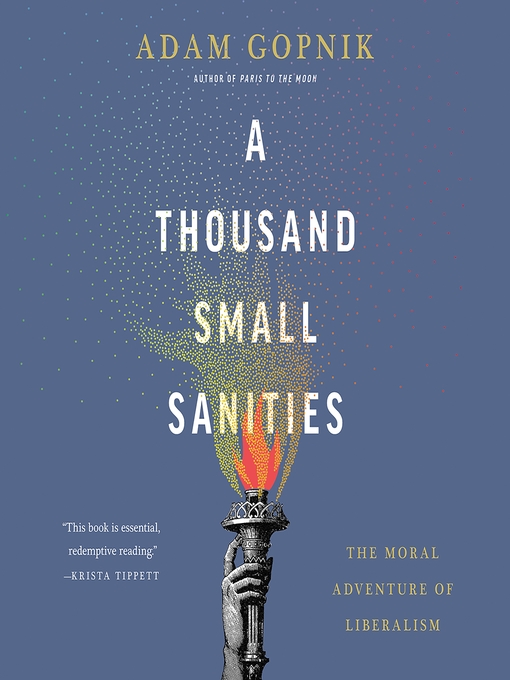Not since the early twentieth century has liberalism, and liberals, been under such relentless attack, from both right and left. The crisis of democracy in our era has produced a crisis of faith in liberal institutions and, even worse, in liberal thought.
A Thousand Small Sanities is a manifesto rooted in the lives of people who invented and extended the liberal tradition. Taking us from Montaigne to Mill, and from Middlemarch to the civil rights movement, Adam Gopnik argues that liberalism is not a form of centrism, nor simply another word for free markets, nor merely a term denoting a set of rights. It is something far more ambitious: the search for radical change by humane measures. Gopnik shows us why liberalism is one of the great moral adventures in human history — and why, in an age of autocracy, our lives may depend on its continuation.
-
Creators
-
Publisher
-
Release date
May 14, 2019 -
Formats
-
OverDrive Listen audiobook
- ISBN: 9781549176975
- File size: 214753 KB
- Duration: 07:27:24
-
-
Languages
- English
-
Reviews
-
Publisher's Weekly
Starred review from April 8, 2019
According to this militantly nonfanatical treatise, liberalism is the self-doubting creed of cautious, compromising, incremental reform—and that’s why it’s great. New Yorker essayist Gopnik (Paris to the Moon) grounds liberalism not in arid individualism but in emotion and social connection, an animus against suffering and for freedom and equality, an understanding of human fallibility, a tolerance for debate, and a search for lasting improvements through democratic action. To conservatives who say liberal rationalism erodes communities, families, and sacred values, he replies that it allows diverse communities and religious beliefs to flourish without bitter divisions; to left-wingers who condemn it as a cover for capitalist exploitation, he champions liberalism’s record of progressivism without the totalitarian repressions of communism or the essentialist identity politics of today’s left. Gopnik hangs his discussion on vivid profiles of liberal dreamers and doers, from theorist-lovebirds Harriet Taylor and John Stuart Mill to civil rights pioneers Frederick Douglass and Bayard Rustin. He writes with a pithy, aphoristic charm—“what we have today, the insistent sneering insists, is a long, permanent bar fight, where you can’t trust a liberal to throw a bourbon bottle at the bad guys”—that overlies deep erudition and nuanced analysis. The result is a smart, exhilarating defense of the liberal tradition. Agent: Andrew Wylie, the Wylie Agency. -
AudioFile Magazine
Adam Gopnik's essay is presented as a letter to his teenage daughter, who was "shocked and troubled" by the election of Donald Trump in 2016, a reaction shared by many liberal Americans. That personal connection makes the NEW YORKER essayist a natural choice as narrator, and, indeed, his performance adds an air of authenticity to this audio. As he lays out his defense of liberalism--as opposed to leftist ideology--his pace is lively, his delivery is expressive, and his mild humor is delivered with a light touch. While Gopnik's arguments will no doubt be controversial in our increasingly polarized political climate, they probably shouldn't be. Indeed, the listener may be left wishing for a little more edginess and a little less intellectual meandering. D.B. © AudioFile 2019, Portland, Maine -
Kirkus
April 15, 2019
The longtime New Yorker staff writer and prolific cultural critic once again shows his astute awareness of the public's political consciousness in this new work championing "liberalism." In this "distillation and...reduction" of previous essays from the New Yorker over the past 20 years and "a long lifetime's reading of philosophy, history, and biography," Gopnik (At the Strangers' Gate: Arrivals in New York, 2017, etc.) gathers together biographies of and theories from a wide variety of subjects, including Frederick Douglass, Benjamin Disraeli, and James Boswell, in order to define liberalism and clarify its purpose through the ages. Over the course of four discursive chapters, the author demonstrates how these struggles contribute to humanity's incremental improvement: "those thousand small sanities...moving us bit by bit a little bit closer toward the modern Arcadia." Gopnik frames the narrative around a conversation he had on the night of the 2016 U.S. presidential election with his 17-year-old daughter ("A Long Walk with a Smart Daughter"), whom he consoled by explaining why the liberal values her parents brought her up with were "not just some family legacy of attitudes...but ideals that were made reliable by experience and proven true by history." In the "The Rhinoceros Manifesto: What Is Liberalism?" the author shows how the passionate and egalitarian 1850s love affair between John Stuart Mill and Harriet Taylor helped forge one of the first documents on liberalism (Mill's On Liberty). In subsequent chapters, Gopnik examines why the political right hates liberalism--e.g., prizing reason over cultural values, nonbelief in reform--and why the left hates liberalism (the need to be revolutionary). Essentially, the author's "adventure" is not a defense of liberalism as much as a clarification and pieces of fatherly advice for a new generation on liberal reforms and institutions. Gopnik's learned, lofty, occasionally dense study ultimately reasserts the belief in the "infinity of small effects."COPYRIGHT(2019) Kirkus Reviews, ALL RIGHTS RESERVED.
-
Formats
- OverDrive Listen audiobook
subjects
Languages
- English
Loading
Why is availability limited?
×Availability can change throughout the month based on the library's budget. You can still place a hold on the title, and your hold will be automatically filled as soon as the title is available again.
The Kindle Book format for this title is not supported on:
×Read-along ebook
×The OverDrive Read format of this ebook has professional narration that plays while you read in your browser. Learn more here.



